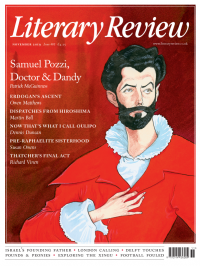Jane O'Grady
All By Myself
A Biography of Loneliness: The History of an Emotion
By Fay Bound Alberti
Oxford University Press 298pp £20
In January 2018 the government set up a ‘Ministry of Loneliness’ to cope with what was described as a spreading ‘epidemic’ – an unfortunate metaphor, since the contagious, unlike the lonely, need to be ‘isolated’ or quarantined. To call loneliness an emotion can be misleading, too, if emotions are considered, as they usually are, to be subjective and on a par with sensations that we fleetingly feel. Fay Bound Alberti is a cultural historian and the sort of emotion theorist who regards emotions more as social constructions than as biological events. Loneliness, she argues, is not so much an individual feeling as the product of a time and place – a social role, something that may not actually be felt.
According to Alberti, the term ‘loneliness’ originated from ‘oneliness’, which simply meant the condition of being alone, and, like its cognates ‘solitary’ and ‘alone’, was more or less factual and emotion-free. ‘Loneliness’ was a word rarely used in a negative sense, or used at all, until the end of the 18th century. Even in the early 1800s, solitude was prized and pursued by Romantic poets and philosophers, who sensed its increasing scarcity as a result of industrialisation and urban spread. Wordsworth ‘wandered lonely as a cloud’; Rousseau enjoyed ‘reveries of a solitary walker’ and wrote a book on them. But Coleridge’s ancient mariner was lamentably ‘alone on a wide wide sea’. Having acquired grimness, ‘loneliness’ suddenly soared in usage (as a graph here convincingly demonstrates), ‘rising to a peak at the end of the twentieth century’.
The development of neutral ‘oneliness’ into unwanted ‘loneliness’ was, says Alberti, due to ‘the rise of individualism’. This is the standard scapegoat glibly invoked for practically any modern malaise, and one she locates as occurring between the 18th and the 21st centuries (which is surely later, and less

Sign Up to our newsletter
Receive free articles, highlights from the archive, news, details of prizes, and much more.@Lit_Review
Follow Literary Review on Twitter
Twitter Feed
The son of a notorious con man, John le Carré turned deception into an art form. Does his archive unmask the author or merely prove how well he learned to disappear?
John Phipps explores.
John Phipps - Approach & Seduction
John Phipps: Approach & Seduction - John le Carré: Tradecraft; Tradecraft: Writers on John le Carré by Federico Varese (ed)
literaryreview.co.uk
Few writers have been so eagerly mythologised as Katherine Mansfield. The short, brilliant life, the doomed love affairs, the sickly genius have together blurred the woman behind the work.
Sophie Oliver looks to Mansfield's stories for answers.
Sophie Oliver - Restless Soul
Sophie Oliver: Restless Soul - Katherine Mansfield: A Hidden Life by Gerri Kimber
literaryreview.co.uk
Literary Review is seeking an editorial intern.